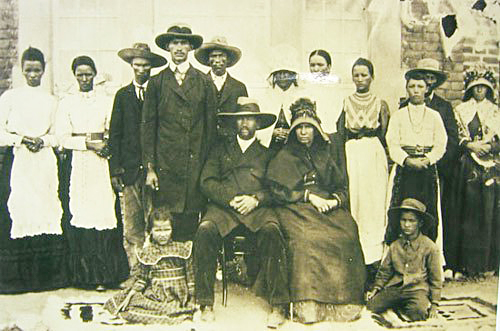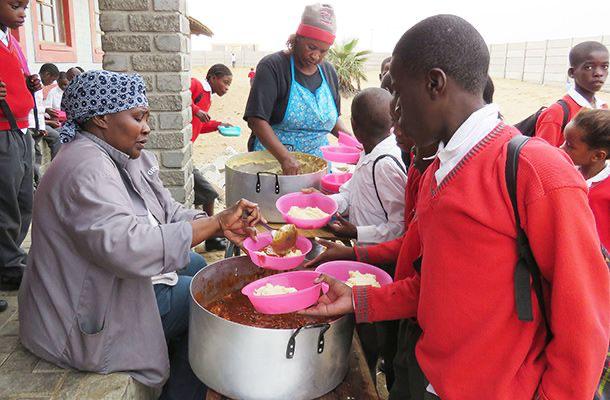About 90 kilometres south of the capital, in the heart of the Kalahari Desert, lies a small town with a rich history, one that often goes unmentioned.
In the Bible, when Isaac, the son of Abraham, dug a well in Gerar, he named it Rehoboth. When he did not receive any quarrels from the natives there, he said: “Now the Lord has given us room and we will flourish in the land”.
Almost two millenia later, a place called Rehoboth would be a refuge for an entirely different group of people.
Jacky Britz, former principal and history teacher at M&K Gertze High School at Rehoboth as well as the chairman of the Sam !Khubis festival committee, took The Weekender on a journey through the rich culture of this community, speaking about the trials and the triumphs of the Rehoboth Basters.
The origin of the Basters lies in the Dutch Cape Colony in South Africa, Britz said. “In a nutshell, you can say that the Basters are a product of a Khoekhoe mother and a European father,” Britz said, adding that men from various European backgrounds such as England, Ireland, Scotland, the Netherlands, and of course Germany, would father children in these colonies.
“Someone pointed out that the Basters of those years are the product of sexual frustrations.”
The former history teacher went on to mention that the children born out of these engagements were left without an identity, although their upbringing often relied primarily on the father’s culture.
Having said that, the Europeans didn’t necessarily want anything to do with these (Baster) children. “If we look at the German word ‘bastard’, there were negative connotations to it. The numbers just grew from there and they tried to group themselves. At one point, they tried to buy land and made a proposal to the South African government,” Britz said.
There were three Baster representatives present at the court case regarding the buying of the land. One of the white South Africans present said: “This won’t happen. Over my dead body”. Because these Basters would be an ever-present perdition to the other communities, Britz elaborated.
“The whites referred to the Basters simply as ‘Hotnots’.”
The three attendants left the court before the verdict, already knowing the outcome and reported back to the community.
Left in despair, the community decided to pack up and seek greener pastures. They moved towards the Northern Cape and took up residence in Pella, Skietfontein, Komaggas and Leliefontien.
“What played a big role in their movement was the missionaries. They took the responsibility of worship and praise on themselves. At that stage the Basters weren’t organised yet. They would have missionary stations and this is how they received their education,” he said.
This way of living trickled down to many generations and would become the foundation of the Rehoboth Basters, Britz mentioned.
“Interestingly enough, if you take a look 100 years later, the old Baster community placed huge importance on education. If you look at the biggest percentage of the Rehoboth Basters now, they are educated. With a strong biblical background.”
Not long after the court’s verdict, the Basters started devising plans to move away and establish their own identity. The group then elected a captain, Hermanus van Wyk, after which they also drew up a set of laws which would govern them – the ‘Vaderlikke Wette’, or the paternal laws.
These laws were based on the old Roman laws and Britz admitted that he does not entirely know everyone who contributed to this document. As the ‘Vaderlikke Wette’ were based on democratic principles, Britz said they were continuously revised to keep up with the changing times.
After hearing about the land of milk and honey, the Basters sent men northwards across the Orange River to inspect South West Africa (now Namibia).
“The men reported back and about 90 families then decided to cross the Orange River with their ox-wagons. They reached Berseba where they stayed with the Namas for about two years,” Britz said, adding that the search for their own land continued until they stumbled upon the area now known as Rehoboth, which at the time belonged to the Swartbooi clan.
“There were many negotiations surrounding the land. Different people with different agendas have different interpretations of how this area became Rehoboth. In my understanding, originally, there was a purchase agreement with horses and ox-wagons which were used as currency,” Britz said.
Shortly after, quarrels erupted between the new residents of Rehoboth and the Namas, and fights soon followed.
Britz mentioned that the original area of Rehoboth was enormous. Northwards, it stretched up towards Aries, and to the west it touched the sea, while southwards, it met the borders of Kalkrand.
“It was a very big area. In 1870, they arrived in Rehoboth and started developing the town. At one time, they were farmers, but they were also specialised in gardening,” Britz said. Since the trek from South Africa was partially in search of land and identity, it seemed the Basters had now found both.
“From 1870, strictly speaking, you don’t refer to Basters any more. They looked for their own identity and they found it. From then on out, you are required to refer to the Rehoboth Basters.”
One question that often pops up in conversations surrounding Coloureds and Basters is: ‘What is the difference?’
“Many groups intermarry and have children; these children are Basters, in other words, children of mixed blood. That is the difference between a Baster and a Rehoboth Baster,” Britz said.
“There’s no difference between Coloureds and Basters, but there’s a difference between Coloureds and Rehoboth Basters,” Britz mentioned.
Stay informed with The Namibian – your source for credible journalism. Get in-depth reporting and opinions for
only N$85 a month. Invest in journalism, invest in democracy –
Subscribe Now!










